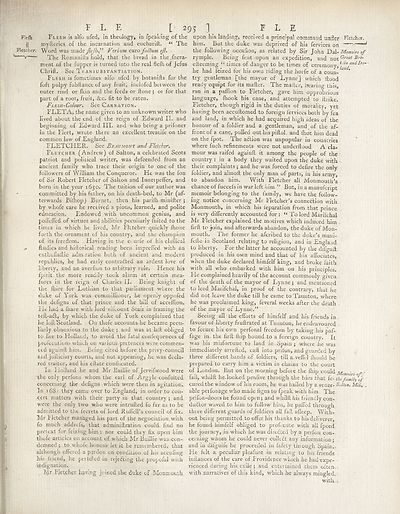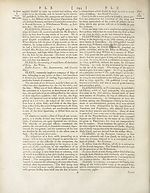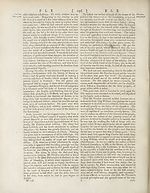Encyclopaedia Britannica > Volume 7, ETM-GOA
(321) Page 295
Download files
Complete book:
Individual page:
Thumbnail gallery: Grid view | List view

F L E [ 295 ] F L E
Fleflj Flesh is alfo ufed, in theology, in fpeaking of the
|) myfteries of the incarnation and eucharilt. “ The
Fletcher. Word was made JleJh” Verlum caro fu3um eji.
~ v—~ The Romanics hold, that the bread in the facra-
ment of the fupper is turned into the real flelh of Jefus
Chrifl. See Transubstantiation.
Flesh is fometimes alfo ufed by botanifts for the
foft pulpy fubftance of any fruit, inclofed between the
outer rind or Ikin and the feeds or ftone; or for that
part of a root, fruit, &c, fit to be eaten.
FiESH-Colour. See Carnation.
FLETA, the name given to an unknown writer who
lived about the end of the reign of Edward II. and
beginning of Edward III. and who being a prifoner
in the Fleet, wrote there an excellent treatife on the
common jaw of England.
FLETCHER. See Beaumont and Fletcher.
Fletcher (Andrew) of Salton, a celebrated Scots
patriot and political writer, was defcended from an
ancient family who trace their origin to one of the
followers of William the Conqueror. He was the fon
of Sir Robert Fletcher of Salton and Innerpeffer, and
born in the year 1650. The tuition of our author was
committed by his father, on his death-bed, to Mr (af¬
terwards Bilhop) Burnet, then his parifh minifter ;
by whofe care lie received a pious, learned, and polite
education. Endowed with uncommon genius, and
poffeffed of virtues and abilities peculiarly fuited to the
times in which he lived, Mr Fletcher quickly fhone
forth the ornament of his country, and the champion
of. its freedom. Having in tne ct.urfe of his clafiical
- fludies and hiftorical reading been imprefied with an
enthufiaflic adm.ration both of ancient and modern
republics, he had early contradfed an ardent love of
liberty, and an averfion to arbitrary rule. Hence his
fpirit. the more readily took alarm at certain mea-
fures in the reign of Charles II. Being knight of
the fhire for Lothian to that parliament where the
duke of York was commiffioner, he openly oppofed
the defigns of that prince and the bill of acctflion.
He had a fiiare w'ith lord vifcount Stair in framing the
teft-adl, by which the duke of York complained that
he loft ^Scotland. On thefe accounts»he became pecitr
liarly obnoxious to the duke ; and was at lalt obliged
to free to Holland, to avoid the fatal confequences of
profecutions which on vaiious pretences were commen¬
ced again ft him. Being cited before the privy-council
and jufticiary courts, and not appearing, he w'as decla¬
red traitor, and his eflate confiscated.
In Holland .he and Mr Baillie of Jervifwood were
the only perfons whom the earl of Argyle confuited
concerning the defigns which were then in agitation.
In 1681. they came over to England, in order to con¬
cert matters with their party in that country ; and;
rvere the only two who were intrufted fo far as to be
admitted to the fecrets of lord Ruffell’s council of fix..
Mr Hetcher managed his part of the negociation.with
fo much addrtfs, that adminiflration could find no
pretext for feizing him : nor could they fix upon him
thofe articles on account of which Mr Baillie was-con¬
demned ; to whofe, honour let it be remembered, that
although offered a pardon on condition of his accufing
his friend, he periifted in rejecting the propofal with
indignation.
Mr Fletcher having joined the duke cf Monmouth
upon his landing, received a principal command under Fletcher,
him. But the duke was deprived of his fervices on —
the following occafion, as related by Sir John Dal- Memoirs of
rymple. Being fent upon an expedition, and not Great Bri~
efteeming “ times of danger to be times of ceremony,^" W/re“'
he had feized for his own riding the horfe of a coun- ** *
try gentleman [the mayor of Lynne] which flood
ready equipt for its matter. The matter, hearing this,
ran in a paffion to Fletcher, gave him opprobrious
language, fhook his cane, and attempted to ftrike.
Fletcher, though rigid in the duties of morality, yet
having been accuftomed to foreign fervices both by fea
find land, in which he had acquired high ideas of the
honour of a foldier and a gentleman, and of the af¬
front of a cane, pulled out his piftol. and fhot him dead
on the fpot. The adlion was unpopular in countries
where fuch refinements were not underttood A cla¬
mour was raifed againft it among the people of the
country : in a body they waited upon the duke with
their complaints; and he was forced to defire the only
foldier, and almott the only man of parts, in his army,
to abandon him. With Fletcher all Monmouth’s
chance of fuccefs in war left him ” But, in a manufeript
memoir belonging to the family, we have the follow¬
ing notice concerning Mr Fletcher’s connedlion with
Monmouth, in which his ieparation from that prince
is very differently accounted for : “ To lord Mariichal
Mr Fletcher explained the motives which induced him .
firft to join, and afterwards abandon, the duke of Mon¬
mouth. The former he aferibed to the duke’s mani-
fette in Scotland relating to religion, and in England
to liberty. For the latter he accounted by the difguft
produced in his own mind and that of his affociates,
when the duke declared himfelf king, and broke faith
with all who embarked with him on his principles.
Fie complained heavily of the account commonly given,
of the death of the mayor of Lynne ; and mentfoned
to lord Marifchal, in proof of the contrary, that he
did not leave the duke till he came to Taunton, where
he was proclaimed king, feveral weeks after the death
of the mayor of Eynne.”
Seeing all the efforts of himfelf and his friends in
favour of liberty fruftrated at Taunton, he endeavoured
to fecure his own perfonal freedom by taking his paf-
fage in, the firft ttiip bound to a foreign country. It
was his misfortune to land in . Spain ; where he was
immediately arretted, catt into prilon, and guarded by
three different bands of foldiers, till a.vefTtl fhould be
prepared to carry him a victim in chains to the court
of London. But on the morning before the fhip.could
fail, whilft he. looked penfive through the bars that fe- the family of
cured the window, of his room, he was hailed by a vener- Salton. MS, „
able perfonage who made figns to fpeak with him. The
prifon-doors he found open; and whilft his friendly con-
dudlor waved to him to follow him, he paffed through
three different guards of .foldiers all faft afleep. With¬
out being permitted, to offer his thanks to his deliverer,
he found himfelf obliged to profecute with all fpeed
the journey, in which he was directed by a perfon con¬
cerning whom he could never collect any information;
and in dilguife he proceeded in fafety through Spain..
He felt a peculiar pleafure in relating to his friends
inftances of the care of Providence which he had-expe-
rieneed during his, exile ; and entertained them often,,
with.narratives of this kind, which-he always mingled.
with..
Fleflj Flesh is alfo ufed, in theology, in fpeaking of the
|) myfteries of the incarnation and eucharilt. “ The
Fletcher. Word was made JleJh” Verlum caro fu3um eji.
~ v—~ The Romanics hold, that the bread in the facra-
ment of the fupper is turned into the real flelh of Jefus
Chrifl. See Transubstantiation.
Flesh is fometimes alfo ufed by botanifts for the
foft pulpy fubftance of any fruit, inclofed between the
outer rind or Ikin and the feeds or ftone; or for that
part of a root, fruit, &c, fit to be eaten.
FiESH-Colour. See Carnation.
FLETA, the name given to an unknown writer who
lived about the end of the reign of Edward II. and
beginning of Edward III. and who being a prifoner
in the Fleet, wrote there an excellent treatife on the
common jaw of England.
FLETCHER. See Beaumont and Fletcher.
Fletcher (Andrew) of Salton, a celebrated Scots
patriot and political writer, was defcended from an
ancient family who trace their origin to one of the
followers of William the Conqueror. He was the fon
of Sir Robert Fletcher of Salton and Innerpeffer, and
born in the year 1650. The tuition of our author was
committed by his father, on his death-bed, to Mr (af¬
terwards Bilhop) Burnet, then his parifh minifter ;
by whofe care lie received a pious, learned, and polite
education. Endowed with uncommon genius, and
poffeffed of virtues and abilities peculiarly fuited to the
times in which he lived, Mr Fletcher quickly fhone
forth the ornament of his country, and the champion
of. its freedom. Having in tne ct.urfe of his clafiical
- fludies and hiftorical reading been imprefied with an
enthufiaflic adm.ration both of ancient and modern
republics, he had early contradfed an ardent love of
liberty, and an averfion to arbitrary rule. Hence his
fpirit. the more readily took alarm at certain mea-
fures in the reign of Charles II. Being knight of
the fhire for Lothian to that parliament where the
duke of York was commiffioner, he openly oppofed
the defigns of that prince and the bill of acctflion.
He had a fiiare w'ith lord vifcount Stair in framing the
teft-adl, by which the duke of York complained that
he loft ^Scotland. On thefe accounts»he became pecitr
liarly obnoxious to the duke ; and was at lalt obliged
to free to Holland, to avoid the fatal confequences of
profecutions which on vaiious pretences were commen¬
ced again ft him. Being cited before the privy-council
and jufticiary courts, and not appearing, he w'as decla¬
red traitor, and his eflate confiscated.
In Holland .he and Mr Baillie of Jervifwood were
the only perfons whom the earl of Argyle confuited
concerning the defigns which were then in agitation.
In 1681. they came over to England, in order to con¬
cert matters with their party in that country ; and;
rvere the only two who were intrufted fo far as to be
admitted to the fecrets of lord Ruffell’s council of fix..
Mr Hetcher managed his part of the negociation.with
fo much addrtfs, that adminiflration could find no
pretext for feizing him : nor could they fix upon him
thofe articles on account of which Mr Baillie was-con¬
demned ; to whofe, honour let it be remembered, that
although offered a pardon on condition of his accufing
his friend, he periifted in rejecting the propofal with
indignation.
Mr Fletcher having joined the duke cf Monmouth
upon his landing, received a principal command under Fletcher,
him. But the duke was deprived of his fervices on —
the following occafion, as related by Sir John Dal- Memoirs of
rymple. Being fent upon an expedition, and not Great Bri~
efteeming “ times of danger to be times of ceremony,^" W/re“'
he had feized for his own riding the horfe of a coun- ** *
try gentleman [the mayor of Lynne] which flood
ready equipt for its matter. The matter, hearing this,
ran in a paffion to Fletcher, gave him opprobrious
language, fhook his cane, and attempted to ftrike.
Fletcher, though rigid in the duties of morality, yet
having been accuftomed to foreign fervices both by fea
find land, in which he had acquired high ideas of the
honour of a foldier and a gentleman, and of the af¬
front of a cane, pulled out his piftol. and fhot him dead
on the fpot. The adlion was unpopular in countries
where fuch refinements were not underttood A cla¬
mour was raifed againft it among the people of the
country : in a body they waited upon the duke with
their complaints; and he was forced to defire the only
foldier, and almott the only man of parts, in his army,
to abandon him. With Fletcher all Monmouth’s
chance of fuccefs in war left him ” But, in a manufeript
memoir belonging to the family, we have the follow¬
ing notice concerning Mr Fletcher’s connedlion with
Monmouth, in which his ieparation from that prince
is very differently accounted for : “ To lord Mariichal
Mr Fletcher explained the motives which induced him .
firft to join, and afterwards abandon, the duke of Mon¬
mouth. The former he aferibed to the duke’s mani-
fette in Scotland relating to religion, and in England
to liberty. For the latter he accounted by the difguft
produced in his own mind and that of his affociates,
when the duke declared himfelf king, and broke faith
with all who embarked with him on his principles.
Fie complained heavily of the account commonly given,
of the death of the mayor of Lynne ; and mentfoned
to lord Marifchal, in proof of the contrary, that he
did not leave the duke till he came to Taunton, where
he was proclaimed king, feveral weeks after the death
of the mayor of Eynne.”
Seeing all the efforts of himfelf and his friends in
favour of liberty fruftrated at Taunton, he endeavoured
to fecure his own perfonal freedom by taking his paf-
fage in, the firft ttiip bound to a foreign country. It
was his misfortune to land in . Spain ; where he was
immediately arretted, catt into prilon, and guarded by
three different bands of foldiers, till a.vefTtl fhould be
prepared to carry him a victim in chains to the court
of London. But on the morning before the fhip.could
fail, whilft he. looked penfive through the bars that fe- the family of
cured the window, of his room, he was hailed by a vener- Salton. MS, „
able perfonage who made figns to fpeak with him. The
prifon-doors he found open; and whilft his friendly con-
dudlor waved to him to follow him, he paffed through
three different guards of .foldiers all faft afleep. With¬
out being permitted, to offer his thanks to his deliverer,
he found himfelf obliged to profecute with all fpeed
the journey, in which he was directed by a perfon con¬
cerning whom he could never collect any information;
and in dilguife he proceeded in fafety through Spain..
He felt a peculiar pleafure in relating to his friends
inftances of the care of Providence which he had-expe-
rieneed during his, exile ; and entertained them often,,
with.narratives of this kind, which-he always mingled.
with..
Set display mode to:
![]() Universal Viewer |
Universal Viewer | ![]() Mirador |
Large image | Transcription
Mirador |
Large image | Transcription
Images and transcriptions on this page, including medium image downloads, may be used under the Creative Commons Attribution 4.0 International Licence unless otherwise stated. ![]()
| Encyclopaedia Britannica > Encyclopaedia Britannica > Volume 7, ETM-GOA > (321) Page 295 |
|---|
| Permanent URL | https://digital.nls.uk/189125402 |
|---|
| Attribution and copyright: |
|
|---|
| Description | Ten editions of 'Encyclopaedia Britannica', issued from 1768-1903, in 231 volumes. Originally issued in 100 weekly parts (3 volumes) between 1768 and 1771 by publishers: Colin Macfarquhar and Andrew Bell (Edinburgh); editor: William Smellie: engraver: Andrew Bell. Expanded editions in the 19th century featured more volumes and contributions from leading experts in their fields. Managed and published in Edinburgh up to the 9th edition (25 volumes, from 1875-1889); the 10th edition (1902-1903) re-issued the 9th edition, with 11 supplementary volumes. |
|---|---|
| Additional NLS resources: |
|

